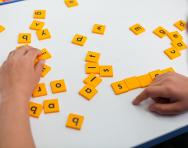7+ entrance exams explained

When your child first starts primary school, the idea of preparing them for exams seems firmly rooted in the future. But if you’re considering a move from a state primary school to an independent prep school at the beginning of Key Stage 2, your child’s first formal exams may already be on the horizon.


Is your child ready to be stretched?
- Download Challenge Packs for your child
- Maths & English packs for each school year
- Encourage your child to work at a greater depth
What are 7+ exams?
For many independent prep schools – those that typically admit pupils at the beginning of Year 3 – children who are applying for a place take assessments known informally as the 7+. ‘At this age, schools feel that they can reasonably accurately assess children’s ability, and so most select on the basis of academic ability at this point,’ explains Susan Hamlyn, director of The Good Schools Guide Advice Service. ‘If children are any younger than this, it’s harder to predict their suitability for that school.’
What’s involved?
The actual admissions procedure for 7+ entry varies between schools. ‘Usually, children are required to do some form of maths and English tests, and in some cases, there is a reasoning test as well,’ Susan says. These tests tend to be quite short – generally around 30 minutes – with a break in between, and are held at the school on a set date. They may be written or computer-based papers, or observed activities where the school will look not just at children’s academic ability but also how they interact and work with others.
‘It’s also normal for schools to request a report from the child’s current school, and to interview children, either individually or in a group,’ adds Susan. In many cases, this will be subject to their performance in the tests, with only those who have reached the required standard invited to be interviewed.
In some cases, children take an initial assessment a few months before the entrance exam. This is used to determine whether they are of the right standard to go ahead and take the formal exam.
7+ entrance exams usually take place early in the spring term, for entry the following September. Your child may then be offered a firm place, a place on the waiting list, or be told that they were unsuccessful.
Who sets the tests?
Again, this depends on the school. ‘Some schools set their own tests, others commission them from outside agencies, and many use a combination of both,’ says Susan. You should contact your preferred school to find out about the sort of tests your child will sit; they will also be able to tell you if any past papers or preparation materials are available.
If you'd like to look through 7+-standard tests, example 7+ papers are available for Westminster Cathedral Choir School in London, who offer 7+ maths papers and 7+ English papers for parents to look through.
How to prepare your child
How much preparation you do with your child will depend on many factors, including their current schooling, how oversubscribed your preferred school is, and whether you have viable state alternatives if your child doesn’t get a place. ‘Tutoring shouldn’t be necessary for bright children who come from good schools, but the pressure for places can lead to a culture where all children are tutored, especially in London,’ Susan explains. ‘A child coming from a state primary rather than a pre-prep will probably need some practice, just to get used to the exam experience, types of questions and how to stick to time limits.’
The best way to prepare your child at home is to stimulate them to think. ‘Encourage reading, hold good conversations and discussions and help to make them feel relaxed and confident,’ Susan advises. ‘Anything you can do that engages your child’s thought processes is good preparation for the test.’
7+ preparation plan
If you're planning to prepare your child for the 7+ yourself you might want to consider our 7+ Learning Journey (available to TheSchoolRun subscribers), a structured plan of 100 English and maths worksheets to follow in order to practise the skills required for most 7+ tests.

Give your child a headstart
- FREE articles & expert information
- FREE resources & activities
- FREE homework help







